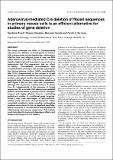Files in this item
Adenovirus-mediated Cre deletion of floxed sequences in primary mouse cells is an efficient alternative for studies of gene deletion
Item metadata
| dc.contributor.author | Prost, Sandrine | |
| dc.contributor.author | Sheahan, Sheahan | |
| dc.contributor.author | Rannie, Dominic | |
| dc.contributor.author | Harrison, David | |
| dc.date.accessioned | 2015-03-16T12:31:01Z | |
| dc.date.available | 2015-03-16T12:31:01Z | |
| dc.date.issued | 2001-08-15 | |
| dc.identifier | 173399370 | |
| dc.identifier | 85496ec7-d928-459d-96ba-aef349aaf983 | |
| dc.identifier | 17744404952 | |
| dc.identifier.citation | Prost , S , Sheahan , S , Rannie , D & Harrison , D 2001 , ' Adenovirus-mediated Cre deletion of floxed sequences in primary mouse cells is an efficient alternative for studies of gene deletion ' , Nucleic Acids Research , vol. 29 , no. 16 , e80 . https://doi.org/10.1093/nar/29.16.e80 | en |
| dc.identifier.issn | 0305-1048 | |
| dc.identifier.other | RIS: urn:641C0C4D6A2DCA66BF6EEFD024640574 | |
| dc.identifier.other | ORCID: /0000-0001-9041-9988/work/64034312 | |
| dc.identifier.uri | https://hdl.handle.net/10023/6245 | |
| dc.description.abstract | This study evaluates the utility of Cre-expressing adenovirus for deletion of floxed genes in primary cells using primary murine hepatocytes. Adenovirus infection was very efficient, even at very low MOI (>95% infection at a MOI of 6) and did not reduce viability. High level LacZ expression was cytotoxic to hepatocytes but Cre expression had no effect on viability. Cre-mediated recombination was completed within a timespan that permits experimentation during primary culture (>95% recombination after 24 h), independently of the number of floxed alleles per cell. Recombination did not induce p53 or produce cytological nuclear abnormalities (even in polyploid cells). Contrary to expectation, deletion of DNA ligase 1 did not alter cell cycle progression, although Cre expression hastens entry to S phase from G(1), independently of the presence of floxed sequences. We conclude that adenovirus-mediated deletion of floxed alleles in primary cells is a straightforward and highly efficient tool for conducting preliminary studies of conditional gene targeting. Primary cells have advantages of differentiation, relative purity and ease of experimentation within controlled conditions, while avoiding confounding problems encountered in vivo (i.e. target cell specificity, kinetics and level of recombination, and elicitation of inflammatory and immune responses). This system could help Identify important phenotypic effects and design and interpret in vivo studies. | |
| dc.format.extent | 7 | |
| dc.format.extent | 254967 | |
| dc.language.iso | eng | |
| dc.relation.ispartof | Nucleic Acids Research | en |
| dc.rights | Copyright © 2001 Oxford University Press. © 2013. First published in Nucleic Acids Research 29, 16, e80 2001, published by the Oxford University Press. The version of record is also available at: http://dx.doi.org/10.1093/nar/29.16.e80 | en |
| dc.subject | Site-specific recombination | en |
| dc.subject | Tumor-suppressor gene | en |
| dc.subject | DNA-ligase-I | en |
| dc.subject | Viral-antigens | en |
| dc.subject | Liver | en |
| dc.subject | Expression | en |
| dc.subject | Mice | en |
| dc.subject | Vivo | en |
| dc.subject | Hepatocytes | en |
| dc.subject | Inactivation | en |
| dc.subject | RB Pathology | en |
| dc.subject.lcc | RB | en |
| dc.title | Adenovirus-mediated Cre deletion of floxed sequences in primary mouse cells is an efficient alternative for studies of gene deletion | en |
| dc.type | Journal article | en |
| dc.contributor.institution | University of St Andrews.School of Medicine | en |
| dc.identifier.doi | 10.1093/nar/29.16.e80 | |
| dc.description.status | Peer reviewed | en |
| dc.identifier.url | http://nar.oxfordjournals.org/content/29/16/e80 | en |
This item appears in the following Collection(s)
Items in the St Andrews Research Repository are protected by copyright, with all rights reserved, unless otherwise indicated.

